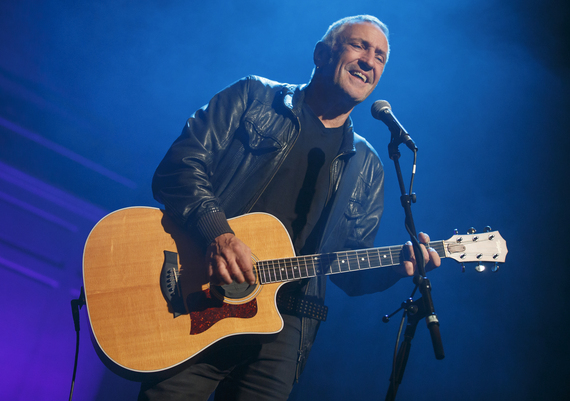Starting this week, Beatlemania lives once again with last night's opening of Lennon: Through a Glass Onion at the Union Square Theater in New York. The latest tribute to part of the most famous and celebrated band of the 20th century is the passion project of U.K. born, turned Aussie actor and singer, John R. Waters. Waters' vision is to tell John Lennon's life not through his role as a rock idol - but as a real and fallible man, searching, somewhat unexpectedly, for a meaningful life.
Occurring in the seconds it took for the bullets shot by Mark David Chapman to ultimately kill Lennon outside The Dakota in 1980, the story stands as a "life flashed before my eyes" experience for theatergoers. However, as simplistic and cliché as the concept may sound, the perspective shared in those "seconds" helps differentiate this production from the other countless Beatles shows that have come before it. Those primarily focused on the story of the legends, not the real, flawed and conflicted men who make up "The Fab Four."
To understand this show though, it's equally as important to know this John too - John R. Waters - who is mostly a stranger to American audiences, and what inspired him to pay homage to Lennon, like so many fans before. There's this charming and relatable story Waters has told about his own experience "discovering" the songs of The Beatles. He heard them for the first time on the radio, unsure at first if they were all male but, just like so many young people around the world, was instantly hooked. Said with vivid detail, he remembers, sweetly, riding his bike to school singing "Strawberry Fields Forever" at the top of his lungs.
Unlike most Beatles fans though, Waters went on to become one of Australia's most recognized actors on film, TV and stage. Like riding his bike to school, many of those shows required him once again to sing at the top of his lungs, now in professional productions of mega-hit shows like Jesus Christ Superstar, Hair and Godspell.
So, in that context, it seems only natural that Waters would go on to merge his love for theater and The Beatles -specifically John Lennon - and mount a show celebrating him through dialogue and song, one that he would go on to tinker with for more than twenty years.
Waters admits about growing up, "I was consumed by the British pop movement of the '60s, because to me as a kid in London, I'd always idolized American culture. The American rock & roll culture... I loved it... I thought these guys, they've got it so good. They go to school in beautiful sweaters with big letters on them, and they drive open-top Cadillac DeVilles." A stark contrast to the "gray skies, drab rain and kind of Dickensian surroundings of suburban London."
Even in the dreariness, however, he found hope for music recorded in his homeland. "Suddenly I found that we, in England, had taken an American music form and made it into something even better - and sold it back," said Waters. "It was a great time to be a young Englishman."
What's different about Waters' interpretation too is that unlike the shows that seek to emulate the Beatles, he wrote the monologue from his own take and perception of Lennon. Therefore the words are themselves an editorial take on Lennon's life and an interpretation of what it must have been like to be both glorified and live under a magnifying glass, while also trying to live a somewhat normal life with a wife and kids.
Also in that interpretation is a purposeful nuance between the new words and famous songs. During the monologue, Waters does a nearly exact impression of Lennon, with all his distinctly recognizable vocal inflections, however he's chosen to sing these iconic songs in his own voice, therefore adding another editorial layer for fan interpretation. Waters says, "I don't sing exactly like Lennon. I just want it to be a guy doing John Lennon's songs who can really express himself in his own way."
All told, Waters' take on Lennon's life can is nearly summed up in the icon's own words, "But then again, you're not to blame, you're just a human, a victim of the insane." A point of inspiration for Waters, he says, "He's written his own epitaph into his song, and that is fucking amazing."
In the monologue between songs, Waters has built in a key element to show the distance between the man and the legend of John Lennon. He says somewhat humorously that many of his lyrics are just random musings that pop into his mind, not necessarily analogies, innuendo or subversive code.
Given that this is a common misperception among fans, I posed the question back to Waters that when hearing that John Waters would be presenting a show called Lennon: Through a Glass Onion, is it in fact possible fans will show up expecting to see the famed director, much better known in the U.S. for their shared name, sitting on stage singing these songs smoking from a bowl or bong (e.g. a "Glass Onion"). Waters laughed and admitted that was the strategy behind adding his middle initial, "R" here in the States, "to differentiate myself from the gentleman from Baltimore." Even his company manager mentioned that when he told people about the show they would say, "John Waters? He can't be John Lennon!" But, this John Waters remains positive and that "I hope that I'm okay with my own identity eventually. It's just going to take the passage of time."
Lennon: Through a Glass Onion plays the Union Square Theater; for information and tickets visit www.lennononstage.com.

